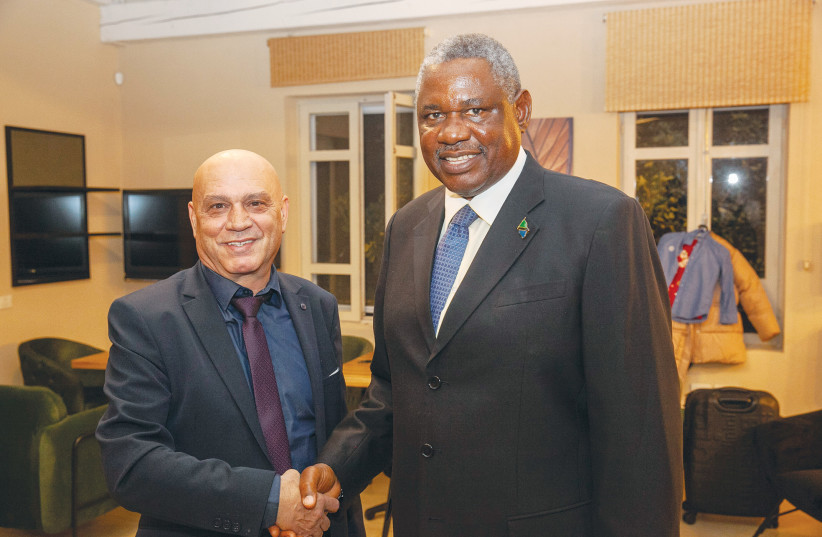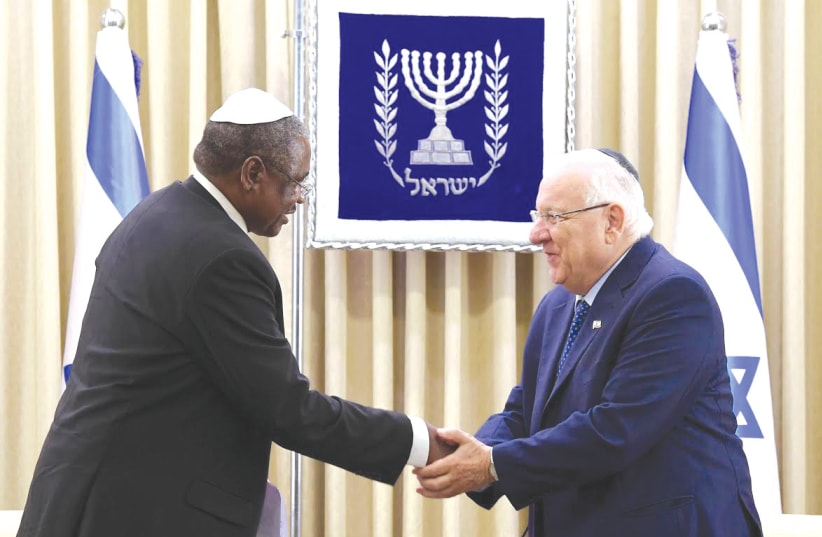Israel should open an embassy in Tanzania to shore up the relationship between the two countries, Ambassador Job Daudi Masima told The Jerusalem Post.
“Our cooperation has to be strengthened,” Masima said, in an interview to mark the end of his five-year term as Tanzania’s first ambassador to Israel.
He arrived in 2017, just one year before the opening of the first-ever Tanzanian Embassy in Israel.
Tanzania on Thursday celebrated its 60th year of independence from Great Britain. It forged diplomatic relations with Israel in 1964, but those ties were severed during the 1973 Yom Kippur War and reestablished only in 1995.
The relationship between his country and Israel had been largely dormant for 20 years until prime minister Benjamin Netanyahu pivoted in the direction of improved ties with African countries and former Tanzanian president John Magufuli took office in 2015.


As a sign of his support for Israel, Magufuli opened an embassy in Tel Aviv and sent Masima, a veteran Foreign Ministry diplomat, as the country’s first envoy since the renewal of ties.
Magufuli’s sudden death in office in March and his replacement with President Samia Suluhu Hassan has placed ties at another crossroads precisely as Masima’s scheduled term has ended.
The two countries have a number of common bonds. They were both formerly governed by Great Britain, and they are both home to natural wonders of the world.
Tanzania has Mt. Kilimanjaro, the highest free-standing mountain the world, while Israel has the lowest point on earth, the Dead Sea.
Like Israel, Tanzania has a history with terrorism. Most famously, al-Qaida bombed the US Embassy in Dar es Salaam in 1998.
There is close cooperation between Israel and Tanzania on the issue of terrorism, Masima said as he sat in his Ramat Gan office.
But to bring the countries closer, Israel must “establish an embassy in Tanzania. That would be a very positive move. I’m looking forward to having an Israeli ambassador in Tanzania.”
At present Israel services Tanzania through Nairobi in Kenya.
A second step would be for a top-level Israeli leader such as the prime minister or president to visit Tanzania, Masima said.
These measures “could strengthen and cement the relationship between the two countries,” he said.
Masima said he had come to Israel with dreams of advancing ties, and that a number of important events had occurred. Both Avigdor Liberman, when he was defense minister, and Ayelet Shaked, when she was justice minister, had visited Tanzania.
Israel plays an important role for Tanzania when it comes to medicine, agriculture, water, technology and security, Masima explained.
“We need to learn from you,” he said.
Israel excels at maximizing resources, he said, noting that with its help Tanzania was improving its production of sugarcane, from 30 tons a hectare to 160. There are some 200 students from Tanzania now in Israel studying agriculture, he said.
Israel has also helped Tanzania medically, particularly through its nonprofit Save A Child’s Heart.
Masima said he had focused in specific on the untapped tourism market in both directions.
Aside from Mt. Kilimanjaro, there are the beaches of Zanzibar and the safari options at the Serengeti National Park, which, according to its website has “over two million ungulates, 4,000 lions, 1,000 leopard, 550 cheetahs, and some 500 bird species inhabit an area close to 15,000 square kilometers.”
Masima said he would have liked to have linked the Ramat Gan Safari Park with the Serengeti Park, so that Israelis planning to visit his country would start with an orientation there.
Tanzania is a country of 62 million, of which 63% are Christian and 34% are Muslim.
Given its holy sites, Israel could be an important tourist destination, Masima said, noting that for him, some of the highlights of his time here have been the moments when he had walked in the footsteps of Jesus.
The Stations of the Cross, he said, “were very moving.”
Tourism has been hampered, he said, by the lack of direct commercial flights. Unless they come on charter flights, tourists have to travel through Ethiopia or Turkey, Masima said.
“My assignment, which I am leaving without completing,” was to open an easy travel route, Masima said.
The COVID-19 pandemic thwarted those plans, he explained.
“I am sure, for my successor, this will be at the top of the agenda.”
But it all depends on COVID-19. Otherwise, he said, “I am sure in the near future there will be direct flights.”
While in Israel, Masima said, he had traveled to Israel’s borders in the North and the South and was struck by how vulnerable the country was to attack by its enemies.
“When I visited those areas, it was an eye-opener for me,” he said.
It was a point that was brought home to him in specific during the Gaza war in May when rocket sirens went off while he and his wife were home, and they, like the Israelis around them, had to seek shelter in safe rooms.
IN HIS interview with the Post, he highlighted the supportive role his country has played for Israel in international arenas.
In 2016, it had a special role in helping Israel in its battle against the Jerusalem resolution at the United Nations Education, Cultural and Scientific Organization.
For this to happen, two countries needed to call for secret ballot at the World Heritage Committee meeting in Paris in October. Tanzania, which was a member of the committee, spoke up for Israel at the last moment, along with Croatia. The secret vote allowed for more countries to oppose the text without fearing diplomatic repercussions. The resolution passed, but only once the language was softened somewhat.
At the time, Netanyahu publicly thanked Tanzania.
“It was our vote that saved Israel,” Masima said, as he recalled that moment.
Last week, Tanzania took a soft stand in support of Israel on the similar text that went before the UN General Assembly.
Tanzania was one of 21 countries that were absent from the vote on the resolution that referred to the Temple Mount solely by its Muslim name of al-Haram al-Sharif.
Belgium, France, Spain and Italy supported the text, which was approved 129-11, with 31 abstentions.
At the UN, the two countries support each other, he said.
AT AN event at the Amphorae Winery on Tuesday night marking 60 years of Tanzanian independence, Masima spoke of how privileged he felt to have played a role in developing the ties between the two countries.
He and his wife, Masima said, were “so grateful for the opportunity we were given to say we were the first ambassador of the United Republic of Tanzania to the State of Israel.
“It has been the badge of honor of our lives. Not only will we always remember you, not only will we always be grateful to you, but always you will be in our heart,” he said to applause.
He has been particularly frustrated by Israel’s decision since the outbreak of the Omicron variant to label Tanzania a red country, thereby prohibiting Israelis temporarily from visiting there.
In his remarks at the anniversary event, Masima accused Israel and other countries of discrimination for stigmatizing Africa.
“We witnessed the COVID-19 xenophobia,” he said. “We saw unilateral action taken against African countries, who did the right thing of detecting the variant and informed the international community.
“Instead of being praised, they were punished. Let the truth be told: singling out African countries with a travel ban is very unfair and unscientific and discriminatory.
“This is not the way we are going to win together,” he said, adding that “our countries are deeply intertwined. We must understand each other and know how to support each other.
“Alone, one will go fast, but together we will go far,” he said.
